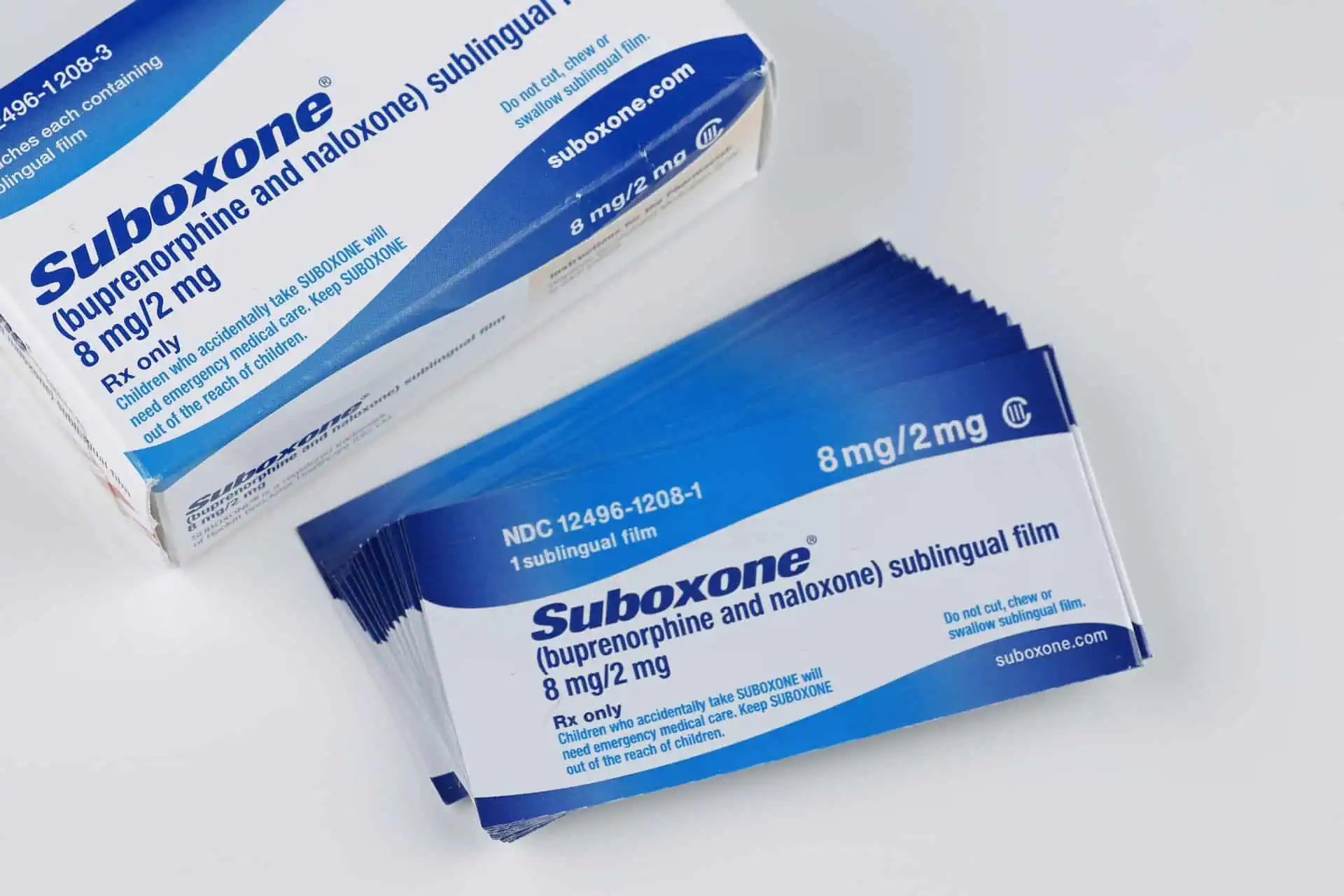FAQ: Do I Qualify for the Suboxone Lawsuit?
- Last Updated: June 12th, 2025

Attorney Jessica Paluch-Hoerman, founder of TruLaw, has over 28 years of experience as a personal injury and mass tort attorney, and previously worked as an international tax attorney at Deloitte. Jessie collaborates with attorneys nationwide — enabling her to share reliable, up-to-date legal information with our readers.
Legally Reviewed
This article has been written and reviewed for legal accuracy and clarity by the team of writers and legal experts at TruLaw and is as accurate as possible. This content should not be taken as legal advice from an attorney. If you would like to learn more about our owner and experienced injury lawyer, Jessie Paluch, you can do so here.
Fact-Checked
TruLaw does everything possible to make sure the information in this article is up to date and accurate. If you need specific legal advice about your case, contact us by using the chat on the bottom of this page. This article should not be taken as advice from an attorney.
Key takeaways:
- To file a Suboxone tooth decay lawsuit, you must prove that you were prescribed Suboxone film or tablets, used them as directed for opioid use disorder treatment, and suffered dental problems or other injuries as a result.
- Gathering evidence such as medical records, dental records, and expert analyses is crucial to demonstrate the link between your prescription Suboxone film and the harm you experienced.
- Contact a qualified Suboxone litigation attorney as soon as possible for a free case evaluation to determine your eligibility and ensure you file within the statute of limitations for your state.
Do I Qualify for the Suboxone Lawsuit? Let's Discuss
Question: Do I qualify for the Suboxone lawsuit?
Answer: To qualify for a Suboxone lawsuit, you need to prove that you were prescribed Suboxone film or tablets for opioid use disorder treatment, used the medication as directed, and subsequently suffered dental problems or other injuries linked to Suboxone use.
On this page, we’ll discuss this question in further depth, eligibility criteria for filing a Suboxone lawsuit, process of qualifying for the Suboxone lawsuit with an attorney, and much more.
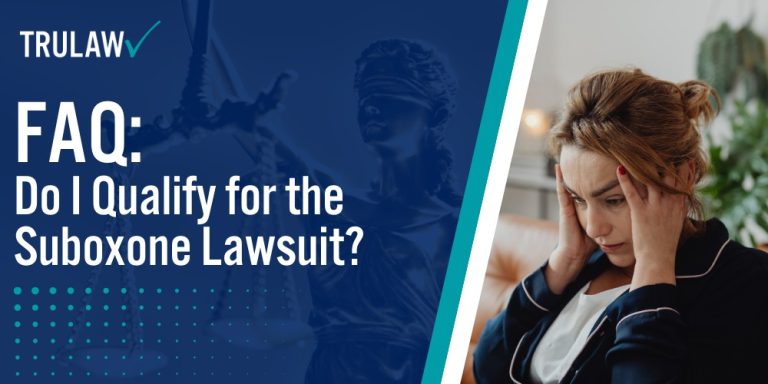
Intro to Qualifying for the Suboxone Lawsuit
To determine if you qualify for a Suboxone lawsuit, there are several key criteria to consider:
- Correct Usage: You must have been prescribed Suboxone by a healthcare provider for opioid use disorder treatment and used it as directed.
- Documented Injuries: You need to have suffered dental problems or other health issues that can be linked to your Suboxone use.
- Evidence Collection: Gathering comprehensive medical and dental records, along with expert analyses, is essential to support your claim.
If you or a loved one has suffered dental problems or other health issues after being prescribed Suboxone film or tablets for opioid use disorder treatment, you may qualify for compensation.
Contact TruLaw using the chat on this page to receive an instant case evaluation to see if you qualify to file a Suboxone lawsuit.
Table of Contents
Eligibility Criteria for Filing a Suboxone Lawsuit
To qualify for a Suboxone lawsuit, individuals must meet specific criteria.
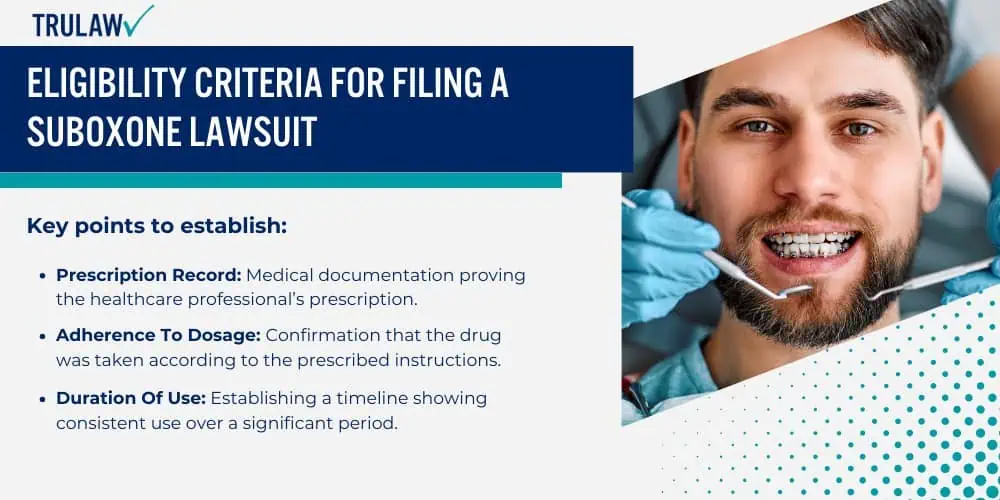
This includes both the correct usage of the drug as prescribed and proof of harm caused by its use.
Prescribed and Used Suboxone as Directed
Persons looking to join a Suboxone lawsuit must have been prescribed Suboxone by a licensed healthcare provider.
This ensures that the drug was intended for opioid addiction treatment and not misused.
Key points to establish:
- Prescription Record: Medical documentation proving the healthcare professional’s prescription.
- Adherence To Dosage: Confirmation that the drug was taken according to the prescribed instructions.
- Duration Of Use: Establishing a timeline showing consistent use over a significant period.
- Professional Oversight: Evidence of regular monitoring by the prescribing physician.
Suffered Injury or Harm Linked to Suboxone Use
Eligibility also hinges on whether the individual suffered documented harm directly related to Suboxone use.
This can include physical, emotional, or economic damage.
Key points to establish:
- Medical Reports: Detailed medical records showing adverse effects linked to Suboxone.
- Expert Testimony: Opinions from medical experts linking the harm to Suboxone use.
- Injury Specifics: Clear description of the injuries or conditions developed from the drug.
- Healthcare Costs: Documentation of incurred medical expenses or required treatments.
Common Injuries Claimed in Qualifying Suboxone Lawsuits
Individuals involved in Suboxone lawsuits often claim specific types of injuries.
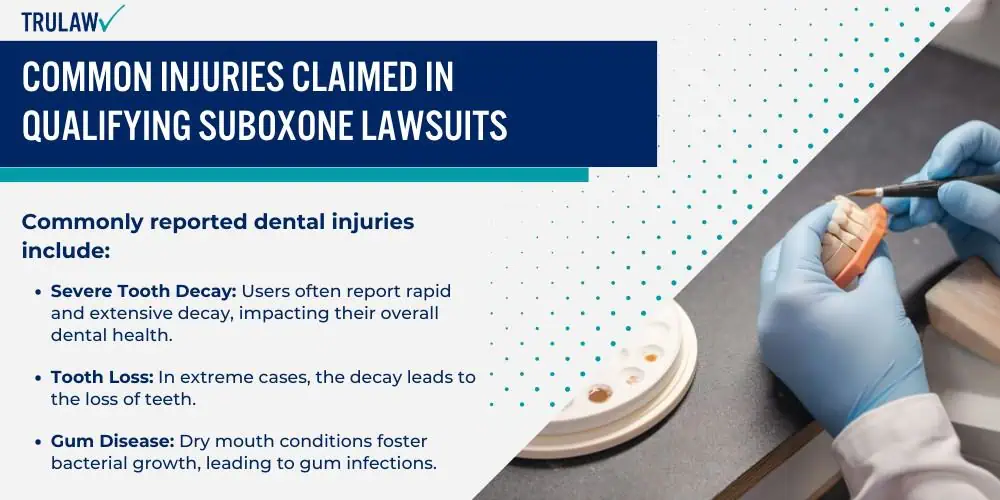
Two primary categories of injuries include dental problems such as tooth decay and other health-related issues.
Dental Problems as Qualifying Injuries in Suboxone Lawsuits
Suboxone tooth decay lawsuits predominantly involve claims of severe tooth decay and other dental health issues experienced by users of the medication.
Suboxone’s formulation can reduce saliva production, leading to an increased risk of dental problems.
Commonly reported dental injuries include:
- Severe Tooth Decay: Users often report rapid and extensive decay, impacting their overall dental health.
- Tooth Loss: In extreme cases, the decay leads to the loss of teeth.
- Gum Disease: Dry mouth conditions foster bacterial growth, leading to gum infections.
- Cavities: Increased susceptibility to cavities is frequently noted.
- Dental Erosion: The protective enamel on teeth can wear down more rapidly.
Individuals claiming these dental injuries may have experienced a significant decline in their dental health, necessitating extensive and costly treatments.
Filing a Suboxone tooth decay lawsuit may help recover damages for medical expenses and pain suffered.
Other Health Issues as Qualifying Injuries in Suboxone Lawsuits
Beyond dental injuries, Suboxone users also report other health issues as part of their Suboxone claims.
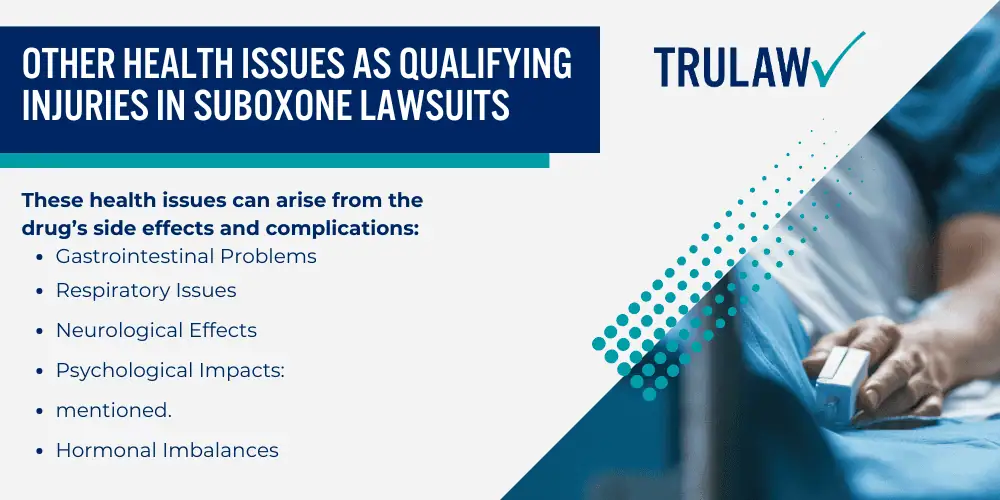
These health issues can arise from the drug’s side effects and complications:
- Gastrointestinal Problems: Nausea, constipation, and abdominal pain are common.
- Respiratory Issues: Shortness of breath and respiratory depression may occur.
- Neurological Effects: Dizziness, headaches, and difficulty concentrating are reported.
- Psychological Impacts: Depression, anxiety, and mood swings are frequently mentioned.
- Hormonal Imbalances: Changes in hormone levels can lead to various physical complications.
These health issues can severely impact the daily lives of Suboxone users, contributing to the grounds for legal action.
Each claim aims to address the adverse effects and seek compensation for the injuries sustained.
Time Limits for Qualifying to File a Suboxone Lawsuit
Understanding the timelines for filing a Suboxone lawsuit is vital.
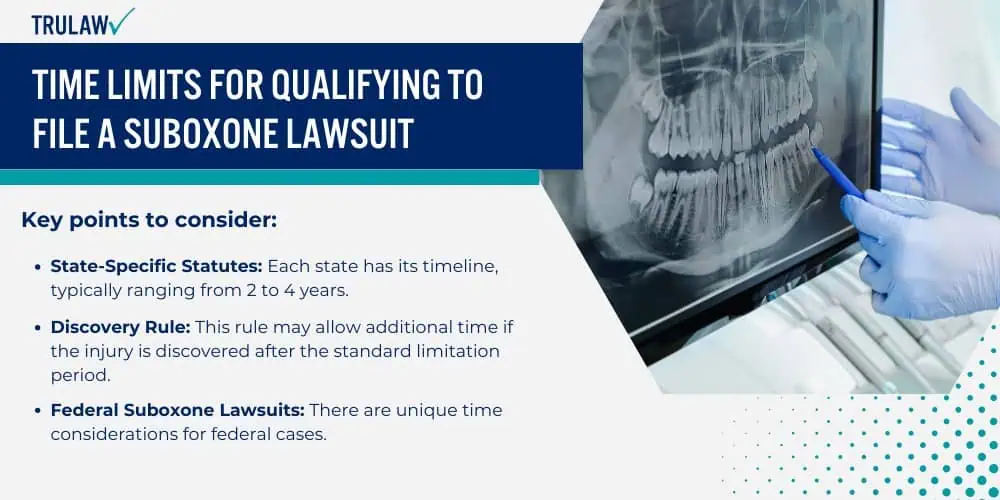
Claimants need to be aware of limitations and potential exceptions that may apply to their cases.
Statute of Limitations for Qualifying Suboxone Lawsuits
The statute of limitations is a key factor when filing a Suboxone lawsuit.
This defines the time period within which a claimant must file their lawsuit.
Each state in the U.S. has specific statutes of limitations.
Key points to consider:
- State-Specific Statutes: Each state has its timeline, typically ranging from 2 to 4 years.
- Discovery Rule: This rule may allow additional time if the injury is discovered after the standard limitation period.
- Federal Suboxone Lawsuits: There are unique time considerations for federal cases.
- Multidistrict Litigation (MDL): MDLs may have separate filing deadlines.
Failure to file within the specified period typically results in the lawsuit being dismissed.
Exceptions Extending Time to Qualify for Suboxone Lawsuit
Some exceptions can extend the qualifying period for filing a Suboxone lawsuit.
These exceptions can provide additional time beyond the standard statute of limitations.
Important exceptions include:
- Minor or Incapacitated Plaintiffs: Time limits may be tolled until the minor reaches legal age or the incapacitated person recovers.
- Fraudulent Concealment: If the manufacturer deliberately concealed the harmful effects, this could extend the filing period.
- Continuing Treatment: Continuous treatment with Suboxone may affect the timeline.
- Military Service: Active duty military may have extended timelines under federal laws.
These exceptions can be complex and may require legal advice to understand fully.
Proving You Qualify for a Suboxone Lawsuit with Evidence
To determine if you qualify for a Suboxone lawsuit, you must present solid evidence that establishes a link between your injuries and Suboxone usage.
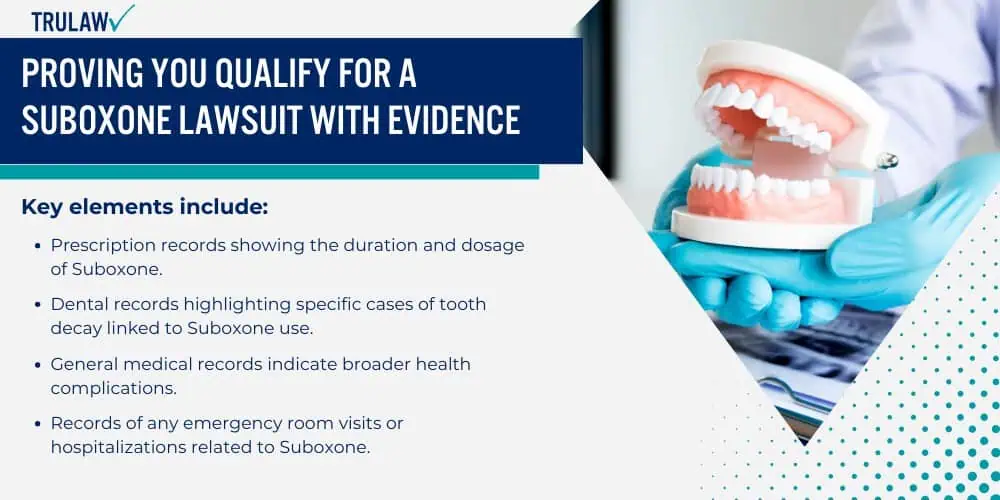
This includes documented medical records and expert analyses that connect Suboxone to specific injuries like Suboxone tooth decay.
Medical Records as Evidence of Qualifying Suboxone Injuries
Medical records are pivotal in proving your eligibility for a Suboxone lawsuit.
These documents should detail your Suboxone prescription and usage, as well as any related injuries or health issues that have arisen.
Key elements include:
- Prescription records showing the duration and dosage of Suboxone.
- Dental records highlighting specific cases of tooth decay linked to Suboxone use.
- General medical records indicate broader health complications.
- Records of any emergency room visits or hospitalizations related to Suboxone.
- Documentation from follow-up visits showing ongoing health issues.
- Specialist reports connecting severe injuries to Suboxone.
Having these documents can help substantiate your claim and demonstrate a direct link to your Suboxone-related injuries.
Expert Analysis Linking Qualifying Injuries to Suboxone Use
In addition to medical records, expert analysis is essential for supporting your case in a Suboxone lawsuit.
Experts can analyze your medical history, usage patterns, and symptoms to establish causation.
Important aspects include:
- Statements from medical professionals who have treated your Suboxone injuries.
- Written opinions from dental experts confirming tooth decay as a side effect of Suboxone.
- Scientific studies or research papers linking Suboxone to specific health problems.
- Testimony from toxicologists explaining the impact of Suboxone on your body.
- Surveys or data showing similar injuries in other Suboxone users.
- Analyses from pharmacologists explaining how Suboxone ingredients cause health issues.
Process of Qualifying for the Suboxone Lawsuit with an Attorney
To qualify for the Suboxone Lawsuit, it’s essential to engage with knowledgeable Suboxone lawyers.
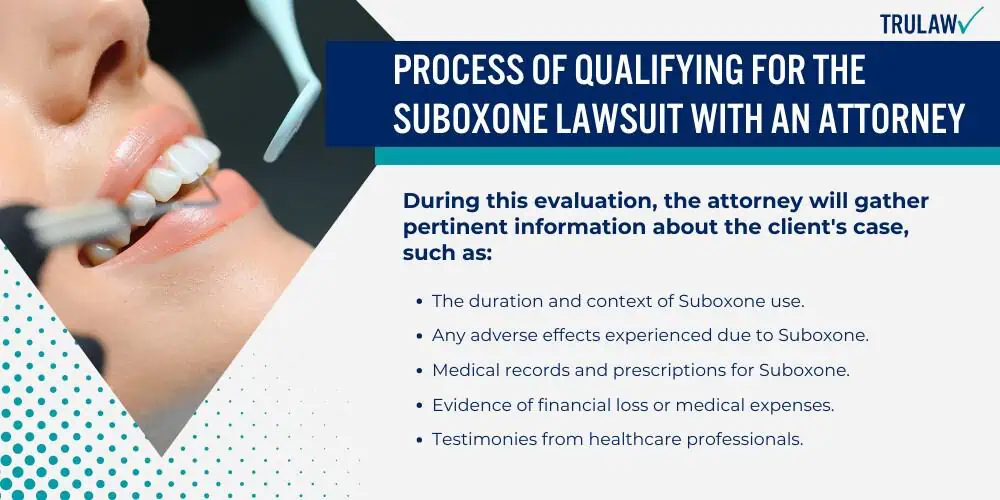
They offer various services such as free case evaluations and contingency representation to assist clients through the litigation process.
Free Case Evaluation to See If You Qualify for Suboxone Lawsuit
The first step involves a free case evaluation with a qualified Suboxone lawyer.
During this evaluation, the attorney will gather pertinent information about the client’s case, such as:
- The duration and context of Suboxone use.
- Any adverse effects experienced due to Suboxone.
- Medical records and prescriptions for Suboxone.
- Evidence of financial loss or medical expenses.
- Testimonies from healthcare professionals.
These elements help the attorney determine whether the client has a valid claim.
This evaluation process is designed to be thorough yet accessible, allowing clients to understand their legal standing without any financial obligation.
Contingency Representation If You Qualify for Suboxone Lawsuit
If the client qualifies, Suboxone lawyers often work on a contingency basis.
This means the client does not pay upfront fees.
Instead, the attorney’s payment is contingent upon winning the case.
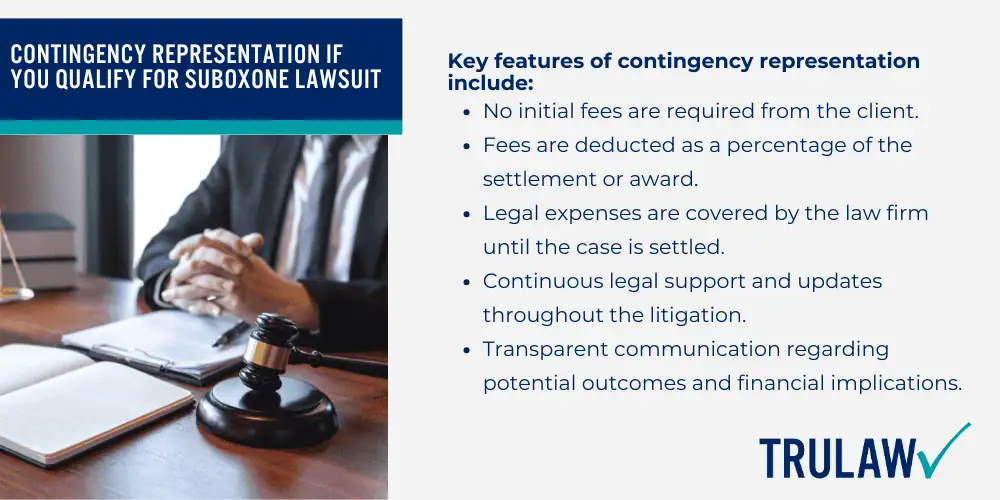
Key features of contingency representation include:
- No initial fees are required from the client.
- Fees are deducted as a percentage of the settlement or award.
- Legal expenses are covered by the law firm until the case is settled.
- Continuous legal support and updates throughout the litigation.
- Transparent communication regarding potential outcomes and financial implications.
TruLaw: Helping Qualifying Suboxone Victims File Lawsuits
TruLaw assists individuals affected by Suboxone by offering comprehensive support and legal guidance.
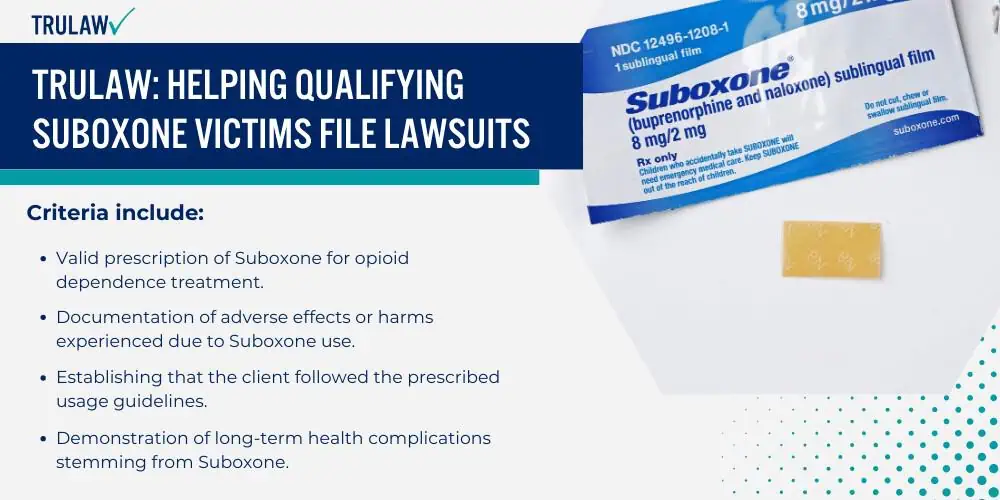
This includes assessing eligibility and helping clients file lawsuits against responsible parties.
TruLaw’s Criteria for Qualifying Suboxone Lawsuit Clients
TruLaw uses specific criteria to determine if clients qualify for a Suboxone lawsuit.
Suboxone lawyer evaluations focus on potential clients’ experiences and evidence.
Criteria include:
- Valid prescription of Suboxone for opioid dependence treatment.
- Documentation of adverse effects or harms experienced due to Suboxone use.
- Establishing that the client followed the prescribed usage guidelines.
- Demonstration of long-term health complications stemming from Suboxone.
- Records of medical expenses and treatments related to these adverse effects.
Contact TruLaw for Suboxone Lawsuit Qualification Assessment
Victims of Suboxone-related issues can begin by contacting TruLaw for an assessment.
The process is designed to be thorough and supportive.
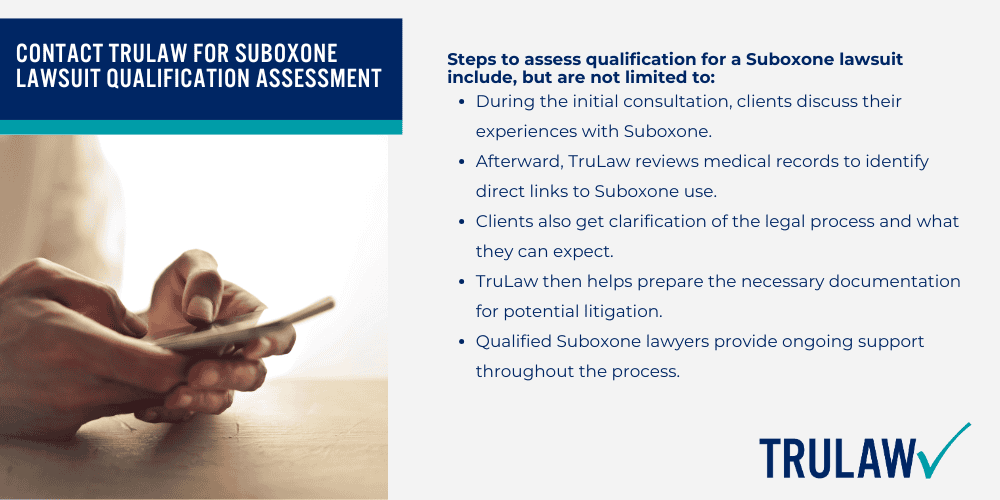
Steps to assess qualification for a Suboxone lawsuit include, but are not limited to:
- During the initial consultation, clients discuss their experiences with Suboxone.
- Afterward, TruLaw reviews medical records to identify direct links to Suboxone use.
- Clients also get clarification of the legal process and what they can expect.
- TruLaw then helps prepare the necessary documentation for potential litigation.
- Qualified Suboxone lawyers provide ongoing support throughout the process.
By providing detailed assessments and clear communication, TruLaw helps clients understand their qualifications and prepares them to proceed confidently.
Suboxone Lawsuit Frequently Asked Questions
-
Is there a Suboxone class action lawsuit?
No, there is not currently a Suboxone class action lawsuit in 2024.
Individual personal injury claims associated with dental issues from taking Suboxone are being consolidated into multi-district litigation within the Northern District of Ohio.
-
What are the eligibility criteria for filing a Suboxone lawsuit?
To qualify for a Suboxone lawsuit, you must have been prescribed Suboxone tablets or Suboxone film by a healthcare provider and used them as directed to treat opioid use disorder.
You must also have suffered documented injuries or harm directly linked to your Suboxone use.
-
What types of injuries are commonly claimed in Suboxone lawsuits?
Suboxone lawsuits often involve claims of severe tooth decay and dental problems, which the medication reducing saliva production may cause.
Other qualifying injuries can include gastrointestinal issues, respiratory problems, neurological effects, psychological impacts, and hormonal imbalances resulting from Suboxone use.
-
Is there a time limit for filing a Suboxone lawsuit?
Yes, the statute of limitations for Suboxone litigation varies by state, typically ranging from 2 to 4 years.
Some exceptions, such as the discovery rule or fraudulent concealment by the manufacturer, may extend the timeline.
It’s crucial to consult with a Suboxone lawyer to understand the specific time limits for your case.
-
What evidence is needed to prove eligibility for a Suboxone lawsuit?
Establishing eligibility for a Suboxone lawsuit requires presenting medical records that document your prescription, usage, and any related injuries or health issues.
Expert analysis from medical professionals, dentists, toxicologists, and pharmacologists can help link your injuries directly to your Suboxone use and strengthen your case.
-
How can TruLaw help me determine if I qualify for a Suboxone lawsuit?
TruLaw offers free case evaluations to assess your eligibility for a Suboxone lawsuit based on criteria such as having a valid prescription, following usage guidelines, and experiencing adverse effects.
If you qualify, TruLaw’s Suboxone lawyers can provide representation on a contingency basis, meaning you pay no upfront fees, and they only get paid if your case is successful.

Managing Attorney & Owner
With over 25 years of legal experience, Jessica Paluch-Hoerman is an Illinois lawyer, a CPA, and a mother of three. She spent the first decade of her career working as an international tax attorney at Deloitte.
In 2009, Jessie co-founded her own law firm with her husband – which has scaled to over 30 employees since its conception.
In 2016, Jessie founded TruLaw, which allows her to collaborate with attorneys and legal experts across the United States on a daily basis. This hypervaluable network of experts is what enables her to share the most reliable, accurate, and up-to-date legal information with our readers!
Additional Suboxone Lawsuit resources on our website:
Here, at TruLaw, we’re committed to helping victims get the justice they deserve.
Alongside our partner law firms, we have successfully collected over $3 Billion in verdicts and settlements on behalf of injured individuals.
Would you like our help?
At TruLaw, we fiercely combat corporations that endanger individuals’ well-being. If you’ve suffered injuries and believe these well-funded entities should be held accountable, we’re here for you.
With TruLaw, you gain access to successful and seasoned lawyers who maximize your chances of success. Our lawyers invest in you—they do not receive a dime until your lawsuit reaches a successful resolution!
AFFF Lawsuit claims are being filed against manufacturers of aqueous film-forming foam (AFFF), commonly used in firefighting.
Claims allege that companies such as 3M, DuPont, and Tyco Fire Products failed to adequately warn users about the potential dangers of AFFF exposure — including increased risks of various cancers and diseases.
Depo Provera Lawsuit claims are being filed by individuals who allege they developed meningioma (a type of brain tumor) after receiving Depo-Provera birth control injections.
A 2024 study found that women using Depo-Provera for at least 1 year are five times more likely to develop meningioma brain tumors compared to those not using the drug.
Suboxone Tooth Decay Lawsuit claims are being filed against Indivior, the manufacturer of Suboxone, a medication used to treat opioid addiction.
Claims allege that Indivior failed to adequately warn users about the potential dangers of severe tooth decay and dental injuries associated with Suboxone’s sublingual film version.
Social Media Harm Lawsuits are being filed against social media companies for allegedly causing mental health issues in children and teens.
Claims allege that companies like Meta, Google, ByteDance, and Snap designed addictive platforms that led to anxiety, depression, and other mental health issues without adequately warning users or parents.
Transvaginal Mesh Lawsuits are being filed against manufacturers of transvaginal mesh products used to treat pelvic organ prolapse (POP) and stress urinary incontinence (SUI).
Claims allege that companies like Ethicon, C.R. Bard, and Boston Scientific failed to adequately warn about potential dangers — including erosion, pain, and infection.
Bair Hugger Warming Blanket Lawsuits involve claims against 3M — alleging their surgical warming blankets caused severe infections and complications (particularly in hip and knee replacement surgeries).
Plaintiffs claim 3M failed to warn about potential risks — despite knowing about increased risk of deep joint infections since 2011.
Baby Formula NEC Lawsuit claims are being filed against manufacturers of cow’s milk-based baby formula products.
Claims allege that companies like Abbott Laboratories (Similac) and Mead Johnson & Company (Enfamil) failed to warn about the increased risk of necrotizing enterocolitis (NEC) in premature infants.
Here, at TruLaw, we’re committed to helping victims get the justice they deserve.
Alongside our partner law firms, we have successfully collected over $3 Billion in verdicts and settlements on behalf of injured individuals.
Would you like our help?
